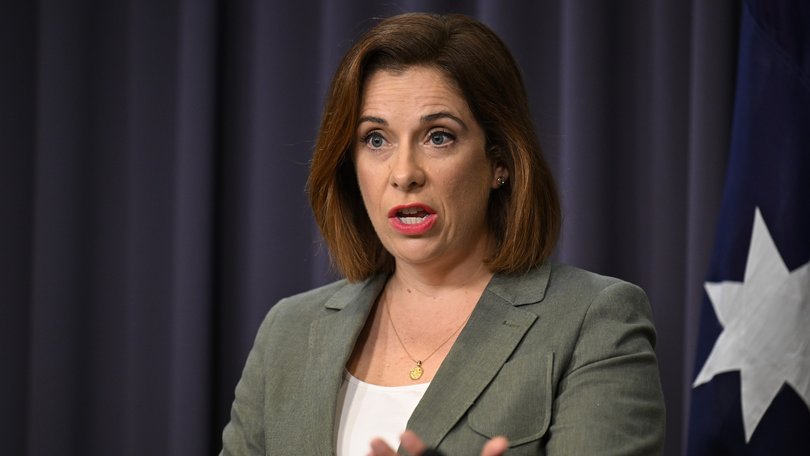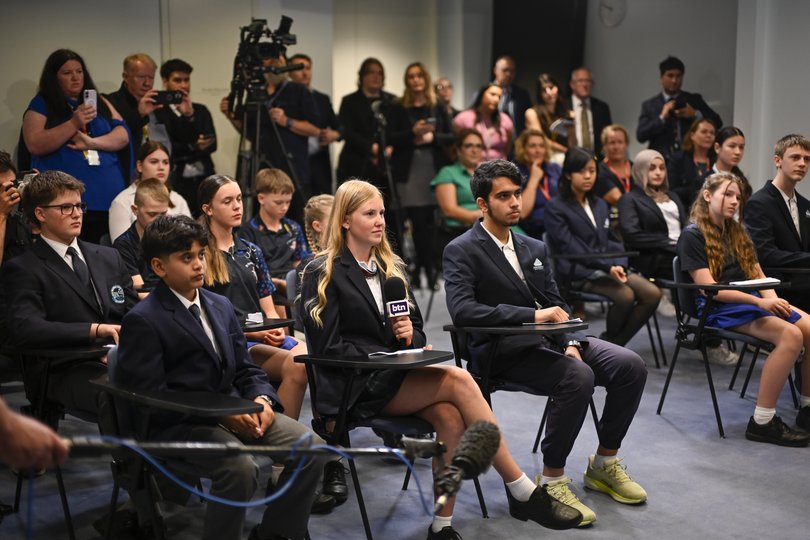Anika Wells ‘won’t be intimidated’ after Australia’s under-16 social media ban hit with High Court challenge
A High Court challenge has been launched against Australia’s under-16 social media ban just a fortnight before it’s due to come into effect on December 10.

A High Court challenge has been launched against Australia’s under-16 social media ban just a fortnight before it is due to come into effect on December 10.
Advocacy group Digital Freedom Project launched proceedings on Wednesday in a bid to overturn the laws, with two 15-year-olds listed as the plaintiffs.
The group’s president and NSW parliamentarian John Ruddick said the ban “should concern every Australian” and labelled it “a direct assault on young people’s right to freedom”.
Sign up to The Nightly's newsletters.
Get the first look at the digital newspaper, curated daily stories and breaking headlines delivered to your inbox.
By continuing you agree to our Terms and Privacy Policy.In a statement, listed plaintiffs Macy Neyland and Noah Jones criticised the blanket ban as “lazy” and warned it could push young people to unsafe corners of the internet and “silence” true digital natives in an increasingly “digital world”.
Communications Minister Anika Wells hit back in Federal Parliament during Question Time, issuing a firm warning that the Government wouldn’t be intimidated by legal challenges.
“Despite the fact that we are receiving threats and legal challenges by people with ulterior motives, the Albanese government remains steadfastly on the side of parents and not of platforms,” she said.
“We will not be intimidated by threats. We will not be intimidated by legal challenges. We will not be intimidated by big tech.”
The legal action comes as Anthony Albanese continued to promote the policy on Wednesday in a mock kid-only press conference at Parliament House.
The Prime Minister and Ms Wells took questions from 15 students in Years 6 to 9 across three Canberra schools.

Their questions focused on how the policy will be enforced, how misuse will be prevented, what protections and support exist for young people, how youth perspectives were included, and whether the policy limits their autonomy or future digital opportunities.
Mr Albanese said the new minimum age legislation was designed to stop “social harm” from the apps and would help get “phone-obsessed” children back on sporting fields, in music lessons and talking to their peers.
“You need time to be able to mature. We want you to spend time on your bike, or on the netball court, or in the swimming pool, or talking to your friends… engaging in human relations rather than just being on your device,” the Prime Minister said.
He admitted it was a “big step” but argued children need to know “what’s real and what’s not real”.
Ms Wells said she had confidence big tech companies could determine which users were underage based on the wealth of data collected.
“These guys are super clever. They’re the most rich and innovative companies in the world. We all get a lot of utility out of what they do,” she said.
She also responded to a question about consultation with underage Australians to say that the eSafety Commission had a Youth Advisory Council that has helped shape their response.
But experts and the Opposition have raised concerns that platforms, children, parents and services aren’t ready as the deadline nears.
Shadow communications minister Melissa McIntosh has repeatedly raised concerns that the roll-out has been a game of “Whack-a-mole” with platforms being added erratically.
Ms McIntosh said she was also concerned about whether the platforms’ communications to users about the ban had been adequate.
Her concerns come as popular messaging app Snapchat was scolded when its in-platform AI bot incorrectly told users that there wasn’t a coming social media ban in Australia.
The misleading information, understood to have been generated when the AI bot defaulted to US rules, prompted Ms Wells’ office to issue the platform a “please explain” on Tuesday evening.
Ms McIntosh said news Snapchat was giving out incorrect information about the ban via its in-platform AI chatbot was “really concerning”.
Speaking at a press conference in Canberra on Wednesday, she criticised the government as being “rushed”, “unprepared” and “not being straight with the Australian people”.
“I’m concerned (about) AI chatbots giving out incorrect information,” she said.
“I’ve been warning about this. It is rushed. The government is unprepared. The Minister has not been straight to the Australian people, and we are now just weeks away.”
It comes as eSafety Commissioner Julie Inman Grant hosted the first meeting of a parent advisory group designed to help inform families and support digital literacy ahead of December 10.
The group consists of 12 organisations reflecting a cross-section of Australian communities serving in a voluntary capacity. It will provide feedback and advice to help inform eSafety’s approach until June 30, 2026.
“Their diverse insights will help us strengthen parent messaging as we transition into the post-implementation phase of the Social Media Minimum Age obligations and expand our broader suite of supports for families,” Ms Inman Grant said in a statement.
The parent advisory group’s next meeting will be held early next year.
